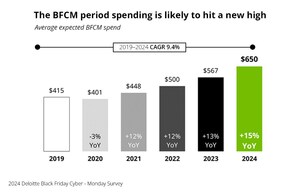Deloitte Issue Brief: Mobile Personal Health Records May Offer Consumers Key to Technology-Enabled Self-Care
Curbs Costs for Treating Chronic Conditions
WASHINGTON, Aug. 26 /PRNewswire/ -- The convergence of personal health records and mobile communication devices may provide the mechanism to engage consumers to use technology to enhance self-care, taking cost out of the health care system, according to a new Deloitte Issue Brief released today by the Deloitte Center for Health Solutions.
Following on the heels of the state of California's launch of the nation's largest telehealth system last week, the Deloitte brief explores the potential benefits of mobile communication devices (MCDs), such as cell phones, smart phones and other mobile tablet personal computers, to collect environmental and patient-entered information and transmit it via the Internet to a personal health record (PHR). Combined with actionable decision support, the MCD-PHR combination, or "mPHR," can analyze aggregate data to activate mobile, patient-specific output such as medication reminders, healthy habit tips and medical bill reminders.
"The personal health record embedded in mobile communication devices – mPHR – is the 'killer app' that may change the game for providers, consumers and payers," said Paul Keckley, Ph.D., executive director, Deloitte Center for Health Solutions. "Considering that treating chronic disease accounts for more than 70 percent ($1.7 trillion) of the total $2.4 trillion in health care spending in the United States, the business case for mPHRs is solid for helping to reduce costs for managing chronic conditions, such as diabetes and obesity."
The brief provides an update on some major pilots underway using the technology, as well as an overview of key research findings on the topic, including the following statistics from the Deloitte 2010 Survey of Health Care Consumers:
- Fifty percent of consumers want a personal monitoring device to alert and guide them to make improvements in their health or treat a condition.
- Approximately six out of 10 consumers (57 percent) want to access an online PHR connected to their doctor's office.
- Twice as many Gen X and Y consumers want to access and maintain their PHRs using a mobile device than do baby boomers and senior citizens – indicating that younger generations are more likely to manage their health using MCDs.
In addition to the possible benefits of mPHRs, the brief also highlights the barriers and possible accelerators to widespread adoption.
The brief outlines four barriers, including a lack of widely-accepted single technical standards among both PHRs and electronic health records (EHRs), limiting the usefulness of mPHRs to integrate data and exchange it between different health care providers. Another barrier includes consumer adoption. According to the Deloitte 2010 Survey of Healthcare Consumers, only 10 percent of American adults currently use a PHR. Other obstacles include consumer privacy and security concerns, as well as provider concerns over liability and data integrity of PHRs.
The brief concludes with five accelerators to position mPHRs as the self-care management platform of the future:
- Greater EHR adoption by hospitals, physicians and allied health providers.
- Increasing regulatory clarity around standardization of health records, privacy protections and provider liability.
- Increasing MCD capacity and functionality.
- Decreasing costs of MCDs (scalability) in tandem with payer incentives for their use.
- Increasing consumerism in health care.
"Unlike some traditional technology adoption curves, the decreased costs of MCDs may not be the single greatest accelerator to adoption of mPHRs," added Keckley. "Instead, state and federal government-created incentives aimed at increasing the adoption of EHRs by health care providers over the next five years under the HITECH Act and American Recovery and Reinvestment Act (ARRA), may end up becoming the more significant catalysts for their adoption."
About Deloitte
As used in this document, "Deloitte" means Deloitte LLP and Deloitte Services LP, a subsidiary of Deloitte LLP. Please see www.deloitte.com/us/about for a detailed description of the legal structure of Deloitte LLP and its subsidiaries.
Related Links:
2010 Mobile Personal Health Record Issue Brief: www.deloitte.com/us/2010mobilepersonalhealthrecord
2010 U.S. Survey Findings: www.deloitte.com/us/2010consumerismsurvey
Paul Keckley, Ph.D. Employee Profile: www.deloitte.com/us/paulkeckley
Deloitte Center for Health Solutions: www.deloitte.com/centerforhealthsolutions
Marykate Reese |
Sean Leous |
|
Public Relations |
Public Relations |
|
Deloitte |
Hill & Knowlton |
|
+1 203 257 0452 |
+1 212 885 0549 |
|
SOURCE Deloitte
WANT YOUR COMPANY'S NEWS FEATURED ON PRNEWSWIRE.COM?
Newsrooms &
Influencers
Digital Media
Outlets
Journalists
Opted In






Share this article